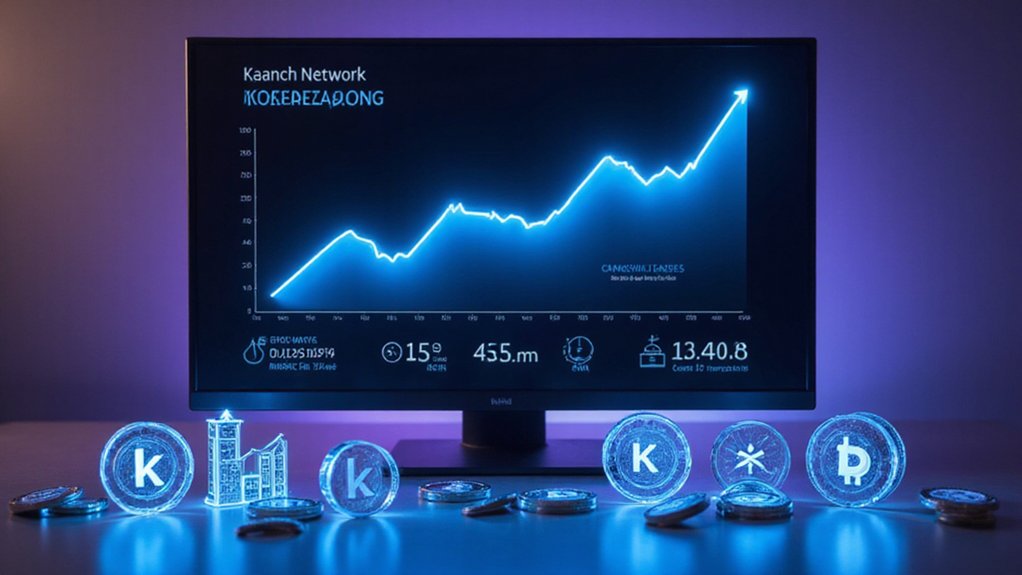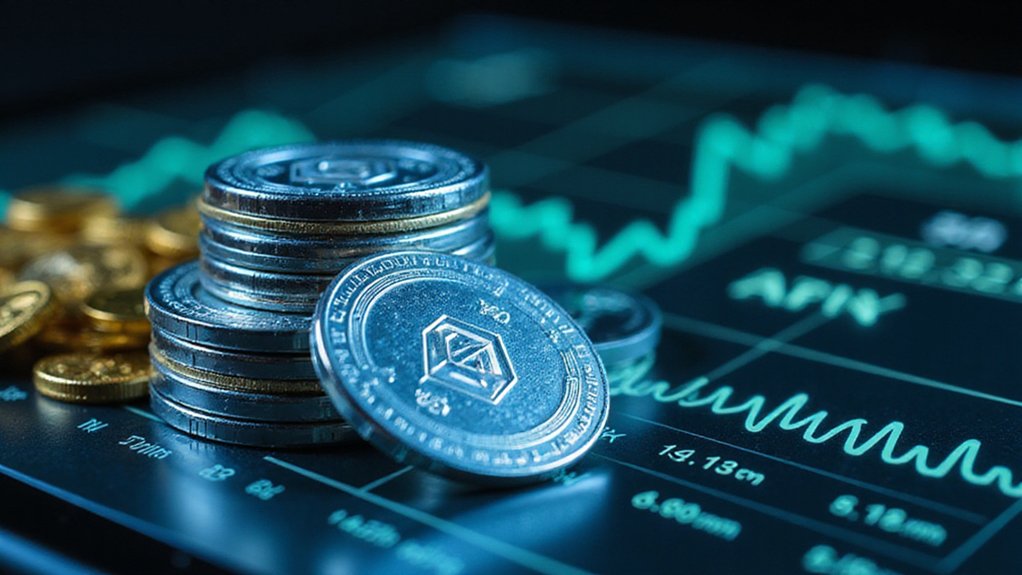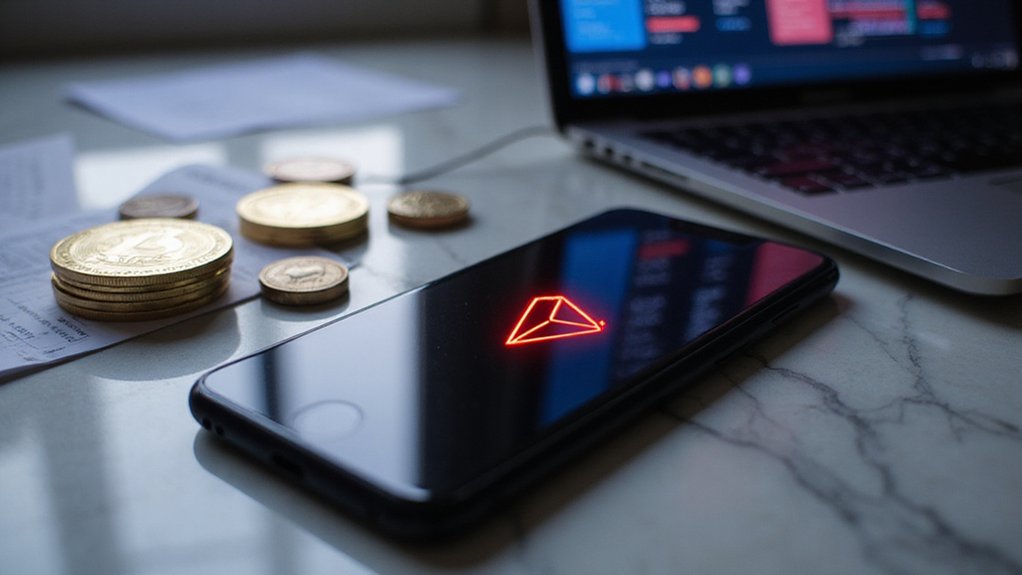Kaanch Exchange emerges as a formidable crypto trading platform, boasting impressive technical specifications with 1.4 million transactions per second and 0.8-second finality. Its built-in RWA framework bridges traditional finance with decentralization while maintaining regulatory compliance. Having raised over $1.12 million across five presale stages, Kaanch offers immediate staking opportunities with up to 119% APY. Its interoperability with major chains and native identity solutions positions it for institutional adoption—a promising trajectory worth monitoring in today’s evolving digital asset landscape.

The emerging Kaanch Network represents a significant paradigm shift in blockchain infrastructure, positioning itself at the intersection of real-world asset tokenization and high-performance computing.
With its staggering 1.4 million transactions per second and sub-second finality (0.8 seconds, to be precise), Kaanch delivers the elusive trifecta of speed, security, and decentralization that has long eluded the blockchain sector.
Kaanch finally cracks blockchain’s impossible triangle with blistering speed and unwavering security through true decentralization.
This architecture—supported by 3600 validators—creates fertile ground for institutional adoption, a holy grail that crypto evangelists have pursued with religious fervor since Bitcoin’s inception.
The platform’s built-in RWA framework enables the tokenization of traditional assets like real estate and bonds, effectively bridging TradFi and DeFi in ways previously relegated to whitepapers and conference panels.
Its modular design appeals to governments and enterprises seeking compliant digital infrastructure without sacrificing the immutability that blockchain purists demand.
The native .knch domains further enhance this ecosystem by providing decentralized identity solutions—a feature whose importance cannot be overstated in an increasingly KYC-obsessed regulatory landscape.
Kaanch’s market positioning proves particularly remarkable as it has raised over $1.12 million through multiple presale stages.
The presale has progressed significantly through five stages since its inception, with the current offering price reflecting the growing investor confidence in the platform’s potential.
Current tokens are priced at $0.16, with projections suggesting this valuation could double in subsequent rounds (though such predictions warrant the standard grain of salt).
What truly distinguishes Kaanch’s tokenomics is the immediate staking availability during presale—offering up to 119% APY, a return that would make traditional finance professionals spill their morning coffee.
The platform’s DAO governance model empowers token holders with voting rights on protocol development and treasury allocation, creating a stakeholder-driven ecosystem rather than the founder-worshipping cults of personality that dominate much of the crypto landscape.
As blockchain infrastructure emerges as the critical narrative for the next market cycle, Kaanch’s thorough approach to interoperability—featuring bridges to Ethereum, Solana, and Binance Smart Chain—positions it as a potential cornerstone in the evolving digital asset ecosystem. Interested investors can participate in the Stage 5 presale through the official portal before the anticipated exchange listing.
Frequently Asked Questions
What Security Measures Does Kaanch Exchange Implement to Protect User Assets?
Kaanch implements a multi-layered security approach to safeguard user assets, featuring decentralized architecture across 3,600 nodes (making it remarkably resilient against single-point failures), robust encryption for assets in transit and at rest, and mandatory two-factor authentication.
The exchange’s security arsenal further includes AML/KYC compliance protocols, regular security audits, withdrawal whitelists, and advanced DDoS protection through cryptographic algorithms—all functioning within a blockchain framework that fundamentally resists centralized manipulation.
How Does Kaanch Exchange Handle Customer Support and Dispute Resolution?
Kaanch Exchange appears to follow industry standards for customer support, likely offering multiple channels including email, contact forms, and possibly AI-powered chatbots for initial inquiries.
Dispute resolution presumably adheres to a ticket-based system with review and investigation protocols, though specific details remain undisclosed.
Response times would theoretically prioritize urgent matters, with secure record-keeping throughout the process.
Given the critical importance of support infrastructure to exchange credibility, users should document all interactions meticulously—trust, after all, remains a finite resource.
What Are the Fees Compared to Other Cryptocurrency Exchanges?
Kaanch Exchange distinguishes itself with near-zero transaction fees—a stark departure from the industry standard where CEXs typically charge 0.1-0.25% per trade and DEXs like Uniswap impose 0.3% swap fees.
This fee structure enables cost-effective execution of high-frequency trades and micro-payments that would be economically unfeasible elsewhere.
While potentially attractive for fee-conscious traders, this model raises questions about long-term sustainability as the exchange balances minimal revenue per transaction against operational costs.
Is Kaanch Exchange Available in All Countries Worldwide?
Kaanch Network doesn’t operate as a traditional exchange but rather as a Layer 1 blockchain focused on asset tokenization.
While its presale is available in multiple jurisdictions where crypto presales are legal, no specific country restrictions have been explicitly documented.
The platform’s interoperable design (compatible with Ethereum, Solana, and BNB chains) suggests broad accessibility, though regulatory compliance would naturally vary by region—a fact that prudent investors should independently verify before participation.
What Verification Requirements Exist for New Kaanch Exchange Users?
New Kaanch Exchange users face standard verification requirements aligned with global KYC/AML regulations.
The process typically demands government-issued identification (passport or driver’s license) in JPG or PNG format, possible biometric authentication through facial recognition, and mandatory two-factor authentication for account security.
While seemingly pedestrian, these verification hurdles—tedious as they may be—serve as the financial industry’s somewhat quixotic attempt to balance accessibility with regulatory compliance and fraud prevention.









